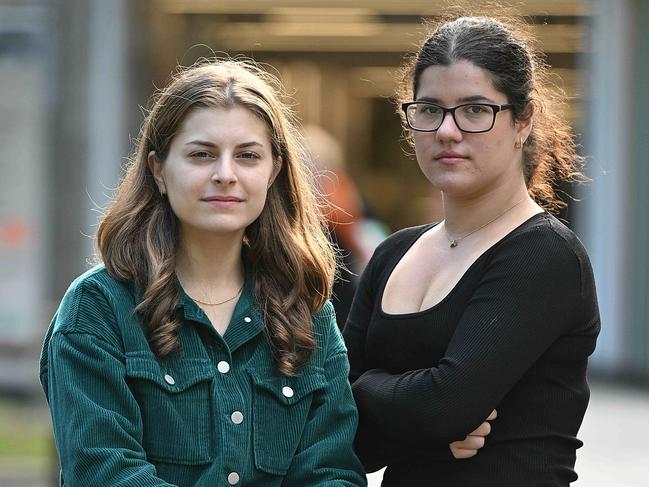Queensland the worst in the country for HECS-debt stress
A new report has revealed Queensland has the highest number of university students owing HECS-HELP debts, with a whopping one in 10 unsure if they will ever be able to pay it off.

Education
Don't miss out on the headlines from Education. Followed categories will be added to My News.
A new report has revealed Queensland has the highest number of university students owing HECS-HELP debts, with a whopping one in ten unsure if they will ever be able to pay it off.
It comes just three months after federal budget where the Government pledged to slash $3bn from student HECS-HELP debt fees.
Choosi’s Cost of Career Report 2024 showed 45 per cent of Queensland’s university students were using HECS - the highest in the country, according to the report.
University students Olivia Martini (QUT) and Olivia Marcoionni (UQ) are among the 34 per cent of students who still live at home while studying to curb cost-of-living pressures ahead of paying off their student loans.
Ms Martini, who studies a Bachelor of Communication, said she managed cost-of-living pressures while studying by staying on a “strict budget”.
“I still live at home so, luckily, I don’t have to manage rent, however, I still have other costs,” she said.
“I do feel guilty about some spending because I feel like I need to be saving all the time.”
Ms Martini said she was stressed about paying off her HECS debt which was “steadily growing”.
“ … Even though I am working full-time, I feel like I am running out of time,” she said.

The report also showed Queensland had the highest cost to travel to university study or training locations averaging $105 a week, closely followed by NSW sitting at $103 weekly.
Relaunch Me Career Coach Leah Lambert said the statistics indicated cuts to HECS debt may have helped in some cases, but the cost of education was “very high” and students were struggling to make ends meet.
“The biggest thing people are putting off is putting a deposit on a house,” she said.
Ms Lambert said the impacts of having to pay off HECS debt went as far as people not getting married or not moving career paths.
“There’s a lot of sacrifices that people are making to study,” she said.
Ms Lambert said there was also lmany “hidden costs” people who considered studying might not realise.
“Things like travelling to uni or buying clothes to wear to work, that all goes into it, then they’re still running the cost of a house,” she said.
Ms Marcoionni is studying a Bachelor of Pharmacy at the University of Queensland and said financially, moving out “wasn’t going to happen” anytime soon.
“I worry in the sense of when I want to buy a house my HECS debt might influence that,” she said.
Ms Marcoionni, currently on placement at Maleny, had to commute there herself and said students did not get any form of payment over their six week placement for their work aside from fuel allocations.
“We now have a day off a week to work our actual job to get some form of payment coming in though,” she said.
“Travelling to uni from my house is also about a forty minute drive,” she said.
Ms Martini agreed fuel was one of her biggest expenses.
“I do have to travel long distances for work and it all adds up,” she said.
The report comes after it was found last year there were 618,271 Queenslanders with a university debt of an average $25,737 in 2022-23, compared to 622,978 people owing $24,090 each.





